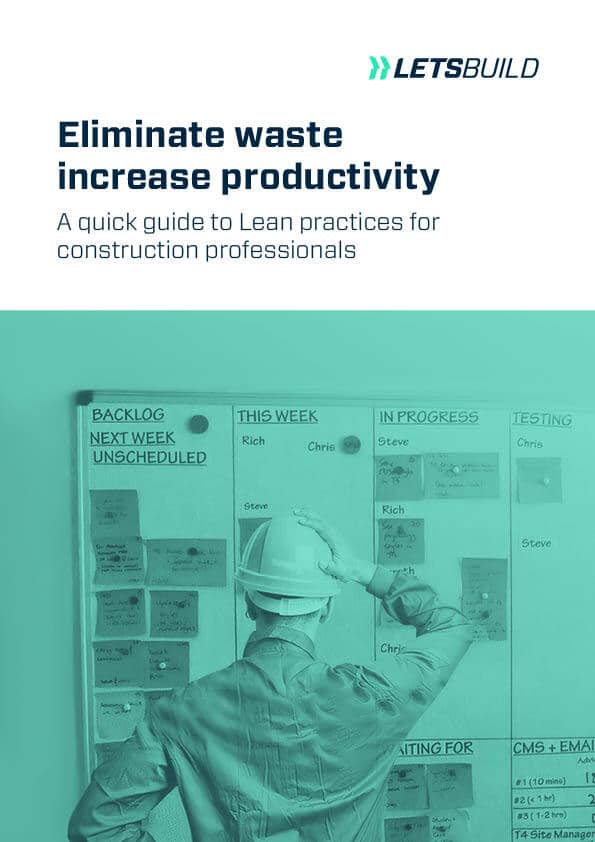Delivering a construction project on time and within budget is a challenge all project managers face. They must work within budget limitations and deadlines for the project to succeed. The simplest solution to this issue is to carry out construction projects as efficiently as possible. But this is easier said than done.
In reality, the situation of a construction project is often far from ideal. While several industries have adopted new technologies to improve efficiency and productivity, the construction industry is significantly lagging behind.
According to McKinsey, global labor-productivity in construction has grown on an average of only 1% per year over the past two decades, compared to a 3.6% growth in manufacturing and a 2.8% growth in the total world economy.
It is evident that construction companies need to address construction efficiency across all projects. Big industry players are working on new techniques and approaches to solve productivity issues–if construction companies fail to adapt, they will be left behind.
Before it affects the bottom line, here are some ways companies can improve construction efficiency.
1. Improve decision-making and management workflow
A huge part of project management is minimizing nonproductive activities that cost the company additional expenses and cause delays. These non-optimal activities include looking for misplaced project data, dealing with conflict resolution involving stakeholders, and fixing mistakes that could’ve been avoided in the first place.
To reduce these nonproductive activities and improve the efficiency of construction projects, here are some tips.
- Review the flow of decision-making. Take a look at the daily on-site activities and operations and review how the decision-making flows starting from when an issue arises. This allows project managers to identify opportunities that can speed up workflow and create a more efficient operation moving forward.
- Measure the current level of productivity. Through this data, managers can pinpoint flaws in the workflow and streamline the operation. In addition, creating a performance incentive system to reward crew members and site managers who meet or even exceed project benchmarks will encourage a more efficient workflow.
- Establish an efficient communication system. Issues regarding slow decision-making usually stem from a lack of a proper communication system. Construction sites are huge and key decision-makers are often not present on the site itself. Eliminate delays by finding a way to communicate with upper management in real time. In addition, set a regular meeting where key decision-makers can ask and answer questions, brainstorm ideas and review the progress of a project.
2. Embrace technology to manage the worksite
Construction lags behind several industries in terms of adopting new technologies. According to McKinsey, the construction industry is one of the least digitized sectors, second only to agriculture. A lot of industry leaders recognize how transformative technology can be in terms of efficiency, and yet, only a few are willing to adopt these new innovations.
However, technology provides a competitive advantage, especially in a more traditional industry like construction. From planning construction sites to managing construction payments, automation will be the future of construction so construction leaders need to leverage them before they get left behind.
There are applications available that tackle specific segments of the construction industry. One example is mobile construction management software. As much as construction management needs to be done on-site, having construction management software on mobile is convenient. Some of the functions managers need to look for in this type of software include:
- Real-time progress reporting
- Field-to-office team communication
- Equipment usage data analysis
- Problem reporting
- Site diary and weather status
Managers can also use project management software to prepare and distribute on-site tasks in the appropriate project phase and assign them to the right people. It provides a clear timeline and schedule that helps reduce project delays and budget oversight.
3. Listen to staff members and provide the right training.
Employees working on-site can provide a better insight into how to make site processes efficient compared to upper management working off-site. They have a wealth of knowledge regarding which equipment works efficiently or which techniques work best. it is important to conduct regular face-to-face meetings with staff members to ask about issues in the workplace and get workflow suggestions.
Experienced workers can also be included in the planning phase. If they are involved early on, they will be able to spot flaws in the plan before it becomes a bigger issue.
Additionally, project managers need to ensure that employees are trained specifically for the job. Training is important for efficiency because it addresses the daily activities on-site that pile up and contributes to project delays if done inefficiently.
Construction supervisors need the right management skills and techniques to be able to lead staff members. Employees should be trained on how to operate new pieces of equipment in order to operate them smoothly. Most importantly, companies must train employees to do tasks the safest way without exceptions.
4. Maximize the use of equipment through regular maintenance
Without specialized pieces of machinery, it is impossible for your workforce to do their daily tasks and finish a construction project. Your workforce needs to conduct regular equipment maintenance to keep their tools in good working condition.
When equipment is not maintained properly, it can cause delays if not addressed immediately. In addition, finding ways to maximize the fuel economy of machinery can provide a significant reduction in your expenses. Finally, avoid using equipment to their limits. This increases the chance of malfunctions and repairs, causing further delays.

5. Improve procurement and supply chain management
One of the top concerns of any construction firm is the sourcing of materials at affordable prices without compromising quality. There is a huge room for improvement when it comes to procurement and supply chain management in construction as the current situation has low to no digitization. Long lead times between filing an order and receiving the materials have a huge impact on the project timeline.
Maintain a positive relationship with suppliers. By being familiar with suppliers, it will be easy for managers to negotiate better deals and identify the suppliers’ order fulfillment process that can be incorporated into the project timeline.
Situations, where a vendor is unable to deliver materials on time, are quite common in the industry. In such cases, managers need to have a list of other material suppliers who can fulfill a request on-demand.
As the demand for construction work increases, the scale and complexity of projects will continually rise. Construction companies need to address their efficiency issues before newer and more disruptive players can catch them off-guard. By following the tips outlined above, organizations can create an efficient construction process that ensures consistent cash flow and a healthy bottom line.
About the Author: Patrick Hogan is the CEO of Handle, where they build software that helps contractors, subcontractors, and material suppliers secure their lien rights and get paid faster by automating the collection process for unpaid construction invoices.





